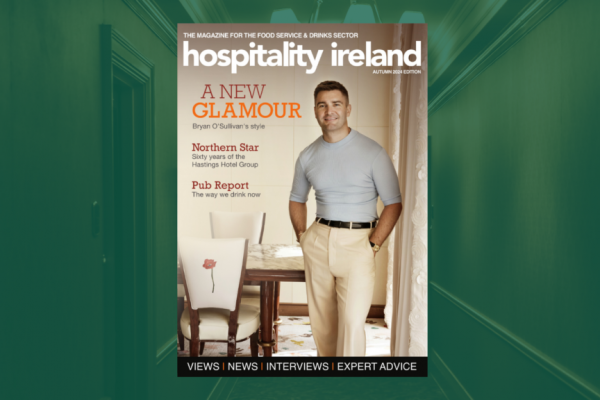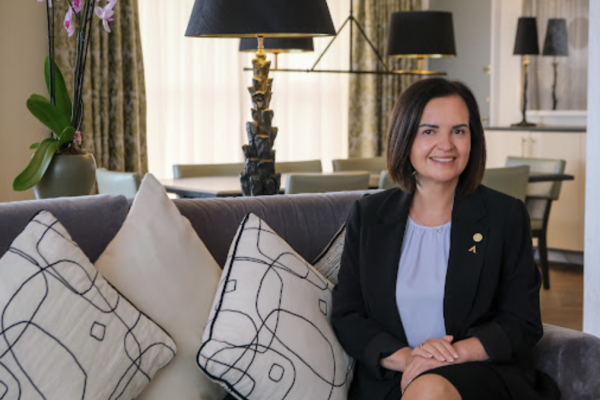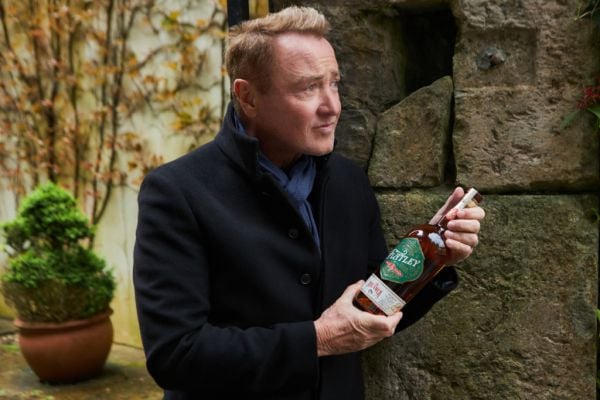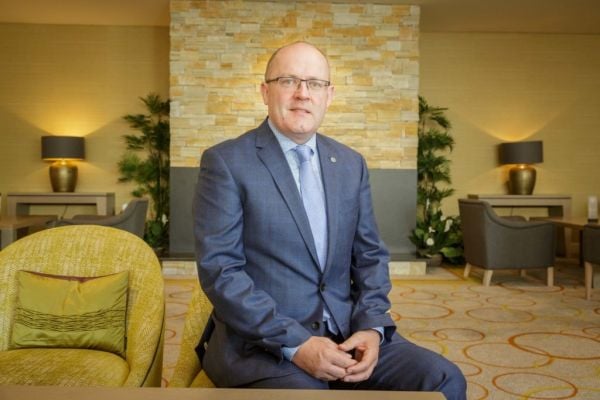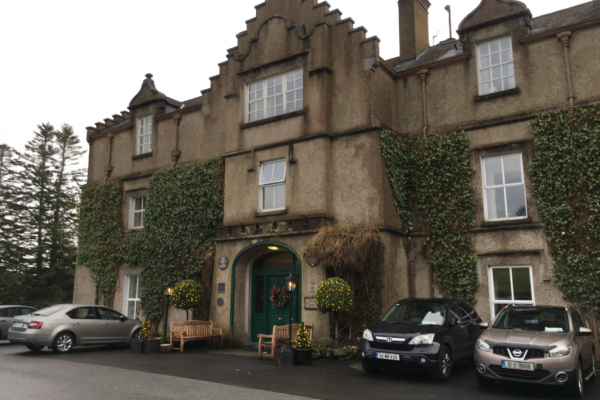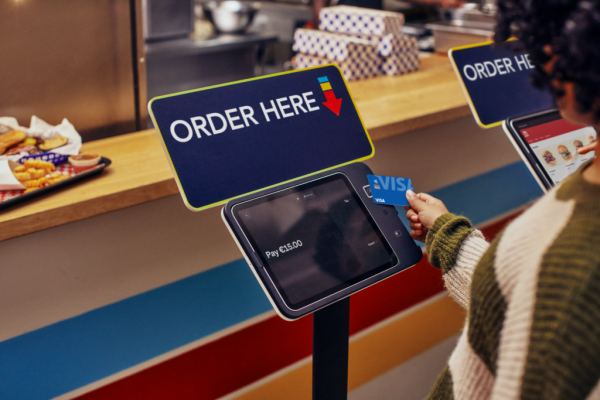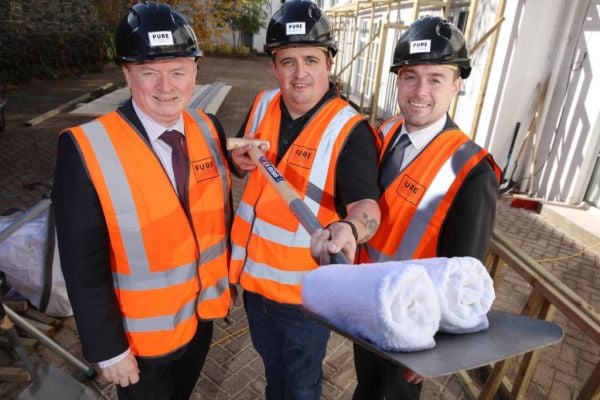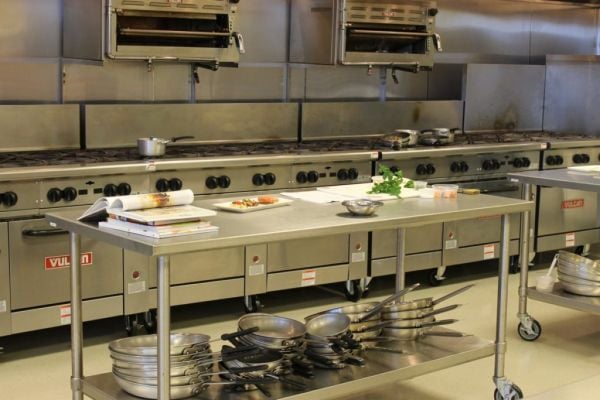Barry O’Neill is the executive head chef of Oliveto at Haddington House, an independent 45-bedroom hotel set across four Victorian townhouses in Dún Laoghaire. He talks to Hospitality Ireland about his career so far, including winning a Michelin Bib Gourmand at Bastible.
This article was originally published in the Spring 2022 issue of Hospitality Ireland Magazine, in March of 2022.
Haddington House started life as four large houses for military officers who were overseeing the building of Dún Laoghaire Harbour. The houses merged to become a ladies’ college in the late 1880s, and were then converted into a seafront house-hotel in the early 1900s. As a hotel, Haddington House still has the distinctive historic character of a coastal Victorian home, offering guests a choice of afternoon tea, dining in Oliveto – a locally loved and widely renowned restaurant – or signature cocktails in the parlour, inspired by the travels of the hotel’s original owner, Adelaide Haddington.
So, Barry, where did your interest in food come from?
Curiosity, I suppose! I had somewhat of a limited food education, growing up. Fish fingers were a regular staple – so much so that I didn’t really understand why people liked fish! Coupled with that were experiences of salmon baked until it was white, or ropey fish pâté from a jar. I found it bemusing that fish could be so universally popular, so when I tried turbot – cooked to perfection – at 16, it was a real through-the-lookingglass moment, a religious experience. It sparked an acute curiosity inside me to figure out, had I been deprived of proper food and real flavour for my entire life?
At that time, music was my passion, but I later found my creative process with music translated quite easily into food and flavour.
You worked at L’Autre Pied, in London – what was that like?
Amazing! There were so many good chefs in that kitchen when I was there – Tom Booton, Luke Matthews, Phil Roe, and, of course, Andy McFadden at the helm. It was an unbelievable learning experience, and a real eye-opener of how much I had to learn. I struggled, initially, to keep up with the pace of the kitchen, but it has stood me in good stead all these years later. I am thankful I got to work there.
Why did you move back to Dublin?
It was a tough choice, but I had commitments back home, and I didn’t think London was ever going to be longterm for me. However, I do regret not making the time to work in more kitchens while I was in London.
What was your ambition with Bastible and Clanbrassil House?
I had no ambition in Bastible at the beginning. I just wanted to do the job as best I could. Barry Fitzgerald was a brilliant mentor and brought out the best in my cooking and thought process. In Clanbrassil House, we just wanted to cook great food – nothing else mattered – and that’s what we did.
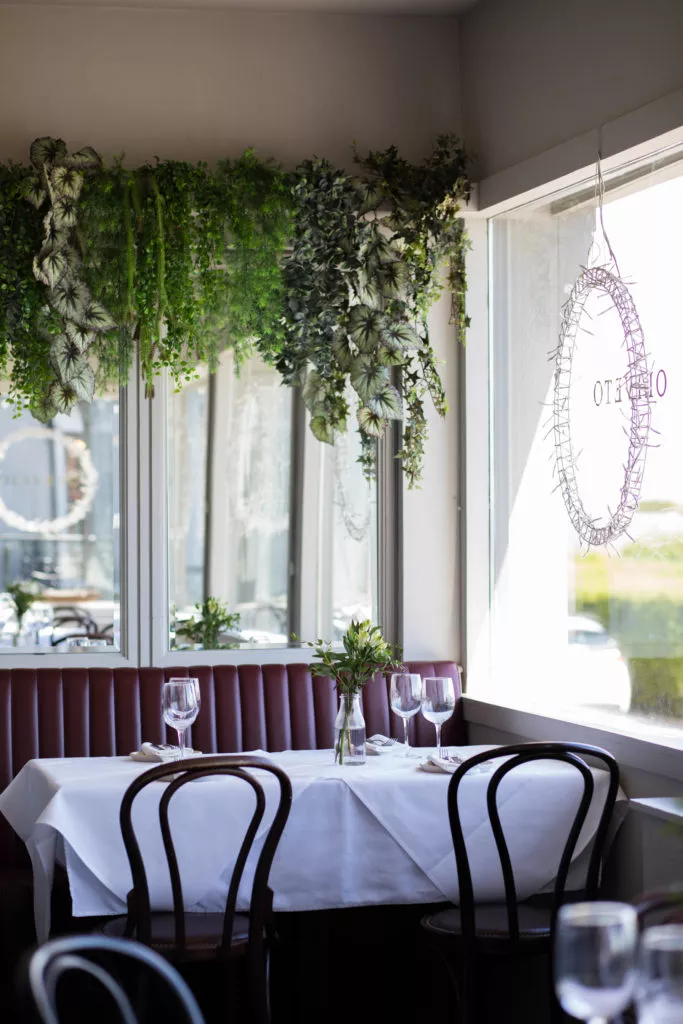
Why the move to Haddington House?
Initially, I was interested in working with Cormac Rowe, who was the head chef in 2018 – Cormac had won a Michelin star for three years running in the Lady Helen – however, what made my mind up to move was the passion and ambition I witnessed in my first meeting with Fla Larkin, Haddington House owner and CEO. His design vision for the hotel, his determination to position Haddington House as a culinary destination, and the senior team he was building around him was exactly the challenge I was looking for. The step-up in role and responsibility was also a key factor, as I was ready to take on a leadership role.
What is the food ethos of Haddington House, and what are the different dining opportunities within the hotel?
Flavour-focused food, working with the seasons, let the produce be the star, and try not to overthink everything. Honest, seasonal, and quality focused are our guiding principles.
At the moment, we have two main offerings: Oliveto and the Parlour Afternoon Tea.
Oliveto is a very busy Italian-inspired neighbourhood restaurant, serving up to 140 covers every evening, seven days a week, with lunch from Friday to Sunday. The deciding factors behind the Oliveto menu are quality, integrity and accessibility. One of the most important things I have learned since joining Haddington House and Oliveto is that Dun Laoghaire is a different animal to town, and we must appreciate and adapt to that. A dish that would receive high praise in a city centre restaurant may not work so well in the Dun Laoghaire area, and we have to factor that into our thought process when designing menus. So, we focus on preparing food of the highest quality, retaining the integrity and the standard that drives our team, but ensuring the menu is accessible to every customer that walks through our door.
Our second and newest food offering is the Parlour Afternoon Tea. This is an elegant and decadent experience served in our parlour room, overlooking Dun Laoghaire Harbour. It very much fits our hotel ethos, as everything we do is inspired by the hotel’s Victorian past, and that of its original owner, Adelaide Haddington.
It is also my own take on afternoon tea, as I have never been a fan of how it is served across Dublin – soggy finger sandwiches, stale macarons, dry scones, and too much of everything. It is unappealing, as well as wasteful.
For our offering, we have adopted the restaurant model and serve three courses individually, to ensure the food is presented at its absolute best. Our team offer a beautiful glass of PiperHeidsieck champagne, to open the palate, and then we serve our first course, which is savoury. This offering is similar to a snack course you would find in a fine-dining restaurant – four or five separate morsels that are taste sensations.
The second course is the traditional element of a tea-and-scone course. Our pastry team has worked incredibly hard to produce a beautiful shortbread scone served with clotted cream and homemade jam. The guest is then offered a menu of Ronnefeldt loose-leaf teas to accompany the scone. The tea is a treat in itself, with incredible flavours, served in the very finest bone china.
The final course is the sweet course, which is made up of three delectable works of art that flow with the seasons. Each pastry is perfectly balanced, to complement the other, and provides a lightness of touch that ensures a fitting conclusion to a very special afternoon tea experience.
There were a lot of eyebrows raised internally when I first pitched the idea, two years ago, and it has taken a lot of hard work to get us to this point. So far, the feedback from guests has been tremendous, and I expect 2022 will see our afternoon tea established as one of the best offerings in Ireland.

What are the particular challenges and opportunities of running a food operation within a hotel?
I think the biggest challenge in a hotel is the need to have mass appeal and providing offerings for all guests’ tastes and expectations, but maintaining very high and inventive culinary standards.
The opportunity is the ability to wear numerous hats and enjoying the pursuit of excellence in all areas of my work, whether it be an ultra-refined restaurant experience or a more casual lunch offering for a corporate guest. I try to treat everything with the same attention to detail. I never thought I would work in a hotel again, let alone have an executive chef role, but I have found the experience in Haddington House quite different and really fulfilling. Every day is different, and it has just the right amount of terror and excitement!
How do you appeal to the local community, as well as guests?
Oliveto has always been positioned as a neighbourhood restaurant, and we welcome the same locals back, week after week. My point about accessibility is important here. If we can provide a food offering that appears almost universally recognisable while maintaining a high standard of food, which the kitchen can also buy into, that nearly ticks every box.
It’s a tough line to tread. On the one side is an offering that could be too niche, too ‘cheffy’, which could alienate some guests. On the other hand, the kitchen team need to be inspired and invested in the food we do here. So, we need to respect our craft and the integrity of what we do as chefs. My job, ultimately, is to hold that line, keep the team invested, foster professional aspirations and creative dispositions, but always keep our guests’ preferences to the fore, be they hotel or local.

How have the last couple of years been for you?
Brutal! I took over as executive chef at the very start of Covid, so I don’t really know how this job is supposed to be, other than in constant crisis mode.
It has been inspiring to see how adaptable and dynamic our industry has been, with very little support. The resilience and ingenuity seen over the past two years was humbling for me. I hope we are close to the end of Covid, but I am quite sure hospitality, as a whole, will emerge from this with so much more to offer, and a resolute belief that we are a stronger community because of it.
What do you see as the major challenges in the industry at the moment?
Staffing! There seems to be no solution to it – nearly everyone I talk with is struggling in one shape or form.
There have been numerous times over the past year where I have worked a slew of consecutive days just to keep the show on the road, and I know it is a similar story throughout the industry. There needs to be a real mandate to get more chefs and hospitality staff into the country and promote third-level education and training for culinary arts.
It’s nearly impossible to get a work visa for a candidate outside of the EU. It’s almost a six-month process, with job ads in the paper needed for several weeks before applying. Chefs are not even listed on the Critical Skills Employment Visa. It’s madness! We have had two years where the difficulties facing our industry have been highlighted in mainstream media, yet there has been no reaction or support from government to facilitate the filling of roles.
What – if any – will be the lasting effects of Covid?
It’s hard to say, but I feel the industry will have a significant Covid hangover for another 12 months unless there is an influx of staff and business can bounce back. Wage supports are still available to businesses affected by Covid, so there could be some more financial hardship and possible closures when these supports end. I hope it’s not the case, but it seems inevitable, as wage inflation is not sustainable.

What new food/dining trends do you see coming within the next year or so?
The quirky/casual fine-dining scene – for lack of a better description – is on the rise: great food, less fuss, less pretence. Nobody wants to be made to feel silly for not knowing the difference between Beluga and Osetra caviar! People just want to have a good time, eat nice food and drink great wine – it’s a simple formula. The more at ease and comfortable guests are in their surroundings, the better their dining experience will be.
Pretentiousness needs to be stamped out in our industry. We should seek to educate in a friendly manner, rather than belittle or judge people for ignorance, which isn’t really their issue. Allta have really found ingenious ways to offer a different dining experience to their guests. Variety Jones is another good example of a casual but great dining experience.
Tell us about the new garden cafe.
We still need to be slightly low-key about the garden ‘cafe’. It has been in the pipeline for a few years, and Covid put the brakes on it being developed. However, we hope to commence building at the back end of 2022, with an opening date in 2023.
Anyone who has visited Haddington House will know the beautiful terraced garden we have in front of the hotel, which offers probably the best vista of any food-and-beverage operation in the city. The plan is to create a unique, allglass dining room with panoramic views of the bay in the garden, equally beautiful on a stormy winter day as it would be on a blue-sky summer day.
The food offering is still in development, but we are inspired by our location between the Dublin Mountains and the sea, and a love of cooking over fire. That’s all I can say for now!
HADDINGTON AT A GLANCE
Number of restaurant/food staff (front and back of house):
- Five chefs plus me in the Oliveto kitchen
- Two chefs in our pastry kitchen
- One breakfast chef
- Three kitchen porters
- Fourteen at front of house, including managers
Number of covers:
Sunday to Thursday, dinner: 60 to 100
Friday and Saturday, dinner:100 to 140
Friday to Sunday, lunch: 40 to 90
Number of bedrooms: 45
Breakdown (percentage) between guests and non-guests dining: 80/20 (non-guests to hotel guests)
Haddington House, 9-12 Haddington Terrace, Dun Laoghaire, Co. Dublin, A96 F2R9; 01 280 1810; www.haddingtonhouse.ie
Read More: Hospitality Ireland Spring 2022: Read The Latest Issue Online!

